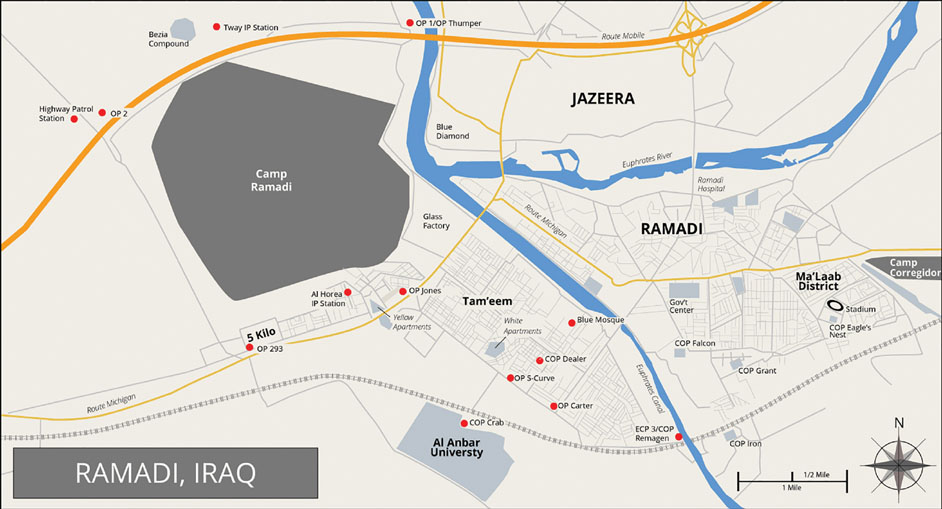RAMADI
DECLASSIFIED

Be sure to access the Bonus Features available only in the eBook!
Click on any of the photos within the book to gain access to in-depth special features that will allow the reader to see more of what the Battle of Ramadi was like from the commanders point of view.

A ROADMAP TO PEACE IN THE
MOST DANGEROUS CITY IN IRAQ
COLONEL ANTHONY E. DEANE, RETIRED
WITH DOUGLAS NILES

Copyright 2016 Anthony E. Deane
All rights reserved. In accordance with the U.S. Copyright Act of 1976, the scanning, uploading, and electronic sharing of any part of this book without the permission of the publisher constitutes unlawful piracy and theft of the authors intellectual property. If you would like to use material from the book (other than for review purposes), prior written permission must be obtained by contacting the publisher at .
Praetorian Books
31501 Roberta Dr.
Bay Village, OH 44140
www.clevelandwriterspress.com
Printed in the United States of America
First Edition: April 2016
10 9 8 7 6 5 4 3 2 1
Praetorian Books is an imprint and trademark of Cleveland Writers Press Inc.
The publisher is not responsible for websites (or their content) that are not owned by the publisher.
Library of Congress Cataloging-in-Publication Data on file with publisher.
Hardcover ISBN-13: 978-1-943052-07-3
eBook ISBN-13: 978-1-943052-08-0
Book & Cover Design: Patricia Saxton
Map Created by: Mary Steele
To the love of my life Debora, who left Firenze for a life with a soldier.
and
To the Soldiers, Sailors, Airmen, and Marines who fought valiantly with Task Force Conqueror, let your sacrifice not be forgotten.

Click on the photo for bonus features.
CONTENTS
PROLOGUE
IN MANY WAYS, DESERT STORM WAS ONE OF THE WORST THINGS that has happened to the United States military, specifically the Army. After expelling Saddams forces from Kuwait in 1991, American political leaders, and the population in general, expected that we could win any war in one hundred hours with few casualties. Yet as the last thirteen years following the decision to invade Iraq in 2003 have shown, that is simply not the case.
By May 2006, the war in Iraq was in its third year and was spinning out of control. Baghdad, the main effort both politically and militarily, was on the verge of an all-out Shia-Sunni civil war. Al Anbar provincethe sparsely populated home of the disenfranchised Sunni minority, and the source of over a third of the total Coalition causalitieswas something of an afterthought. In Anbars provincial capital of Ramadi, the civilian government was shattered, the Iraqi security forces were inept, and the population had no faith in the newly established Iraqi government or Coalition forces to protect them. Things were so bad that the Marine Expeditionary Force Headquarters controlling the province was weeks from assessing the situation as unwinnable.
The previous November, rather than deploying from our home base in Germany directly into combat, our brigade received orders to serve as U.S. Central Commands (CENTCOMs) operational reserve based in Kuwait, known as the Call Forward Force. We were a political statement that the war was going well, and soon enough, American forces could begin drawing down. This was far from the truth.
There appeared to be more of a will to pull out from Iraq than a will to win in Iraq.
That all changed when my armored battalion, Task Force Conqueror, along with our sister Infantry Battalion, were ordered to Ramadi; linking up with parts of Colonel Sean MacFarlands Ready First Combat Team coming from Tal Afar, and a Marine Infantry Battalion, an Army Light Infantry Battalion, as well as a hodge-podge of units from across the services. Given vague orders to Take back Ramadi, but dont make it another Fallujah, (destroying the city in order to save it) the forces were set to change the course of the war.
We came to win.
Upon arrival, we witnessed firsthand that Muslims were by far the majority of victims of jihadist terrorism. A brutal murder and intimidation campaign by Al Qaedas local franchise was underway. With no local governmental structures in place to counter the terrorists, and with the Coalition unable to protect the inhabitants, there was little for the locals to do but acquiesce to the jihadists. The four hundred thousand residents of Ramadi had become unwilling subjects of an Islamic Caliphate.
The Ready First went on the offensive, committed to changing the state of affairs as the Battle of Ramadi unfolded over the summer and fall of 2006. Using new tactics, an ever-increasing emphasis on improving the Iraqi security forces, and an unprecedented outreach to community leaders, we took the fight to Al Qaeda and its affiliates in Iraq. We denied the enemy safe haven by establishing combat outposts in neighborhoods that had not seen a coalition presence in years, effectively breaking the terrorists grip on the population. We also took the local police force from two hundred to three thousand men, providing the locals a stake in their own security. Three months later, a political movement called the Anbar Awakening began in Task Force Conquerors Area of Operation, led by an obscure sub-sheik who had the courage to stand up to the terrorists and the charisma to sway the masses.
Within a year, the Iraqis were holding 5K races down the streets of formerly Al Qaeda-held territory. Once the most dangerous city in Iraq, Ramadi was now one of the safest.
We have defeated a Caliphate already this century by partnering with Muslims who reject the jihadist ideology, denying the enemy a safe haven, winning the battle of ideas, having a political system in place for the future, and having the will to win.
This is how we did itand this is how we can do it again!

THE FATE OF UNBORN MILLIONS WILL NOW DEPEND ONTO GOD, AND ON THE COURAGE AND CONDUCT OF THIS ARMY. WE HAVE, THEREFORE, TO RESOLVE TO CONQUER OR DIE.
General George Washington
CHAPTER 1: FIRST CONTACT
1130 HOURS, 05 JUNE 2006
AS A RULE OF THUMB, WHEN THE BATTALION COMMANDER IS firing his personal weapon, things are going badly. Things were generally bad all across Iraq, especially in Iraqs Anbar province, particularly in the city of Ramadi, and specifically at Entry Control Point 3 where at this moment, all hell had broken loose.
An hour earlier, I had been in one of three Humvees rumbling across the dusty courtyard in front of the headquarters of the 1st Battalion, 35th Armor RegimentTask Force Conqueror. The outgoing company commander, a newly promoted major with a years worth of lessons learned from heavy fighting, led the patrol. At midnight, he was relinquishing responsibility for security operations in the sector to the man in the trail vehicle, Captain Lou Lancon, commander of Bravo Company, 2-6 InfantryTeam Dealer. As task force commander, I was responsible for validating the company-level transfer of authority. I wanted to walk the ground with both commanders one last time before having Lou Lancon take charge. My own task force-level transition with Lieutenant Colonel Mark Lovejoy, commander of the 1st Battalion, 172nd Armored Regiment (1-172 AR) would not happen for another three days. This was my first patrol without Lieutenant Colonel Lovejoy and although he warned me to always bring my full personal security detachment (PSD) of four vehicles whenever I left the wire, I did not heed his advice. Mistakenly, I chose stealth over firepower, not wanting to draw attention with six vehicles in a patrol that normally numbered only three or four. I was looking to get in and out of Tameem as quickly as possible, not get into a major gun battle my first time out.
Next page













